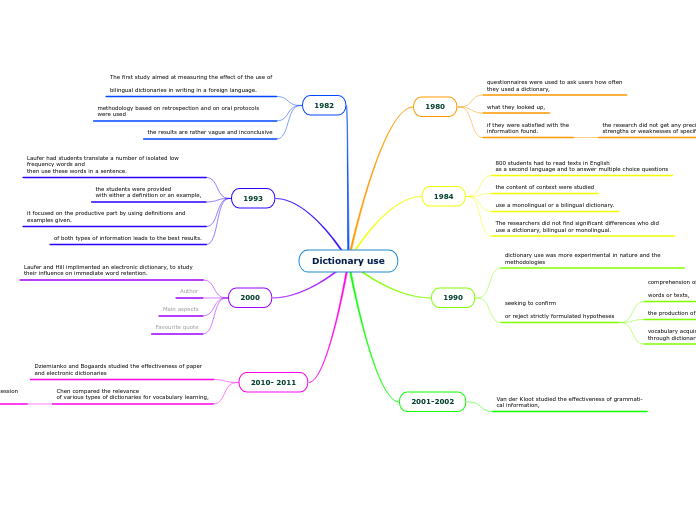Dictionary use
1980
questionnaires were used to ask users how often
they used a dictionary,
what they looked up,
if they were satisfied with the
information found.
the research did not get any precise conclusions about the strengths or weaknesses of specific (types of) dictionaries.
1984
800 students had to read texts in English
as a second language and to answer multiple choice questions
the content of context were studied
use a monolingual or a bilingual dictionary.
The researchers did not find significant differences who did use a dictionary, bilingual or monolingual.
1990
dictionary use was more experimental in nature and the methodologies
seeking to confirm
or reject strictly formulated hypotheses
comprehension of
words or texts,
the production of words or texts
vocabulary acquisition
through dictionary use.
2001-2002
Van der Kloot studied the effectiveness of grammati-
cal information,
1982
The first study aimed at measuring the effect of the use of
bilingual dictionaries in writing in a foreign language.
methodology based on retrospection and on oral protocols were used
the results are rather vague and inconclusive
1993
Laufer had students translate a number of isolated low frequency words and
then use these words in a sentence.
the students were provided
with either a definition or an example,
it focused on the productive part by using definitions and examples given.
of both types of information leads to the best results.
2000
Laufer and Hill implimented an electronic dictionary, to study their influence on immediate word retention.
Author
Main aspects
Favourite quote
2010- 2011
Dziemianko and Bogaards studied the effectiveness of paper and electronic dictionaries
Chen compared the relevance
of various types of dictionaries for vocabulary learning,
testing word retention at the end of the experimental session and two weeks later.
